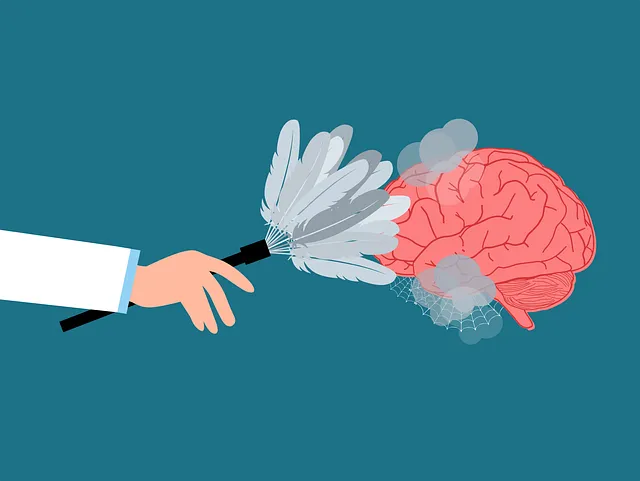Kaiser Permanente's pioneering training programs in Centennial are transforming mental healthcare by prioritizing cultural competence. These initiatives focus on understanding and respecting diverse backgrounds, integrating practices like Mindfulness Meditation and Stress Management Workshops to empower providers in creating personalized treatment plans. By fostering emotional well-being and cultural sensitivity, these programs enhance patient outcomes, particularly in depression prevention among diverse populations, ensuring all patients receive respectful, tailored care.
Cultural sensitivity is paramount in modern mental healthcare, ensuring equitable access to quality treatment. This article explores strategies for enhancing cultural competence within this field, drawing insights from industry leaders like Kaiser Permanente. We delve into their comprehensive approach and examine the impact of targeted training programs, such as those initiated by Centennial, on improving patient outcomes. By examining these initiatives, we uncover practical strategies for mental healthcare professionals to navigate diverse cultural contexts effectively.
- Understanding Cultural Competence in Mental Healthcare: The Kaiser Permanente Approach
- Training Programs and Their Impact: A Look at Centennial Initiatives
- Implementing Cultural Sensitivity: Strategies for Effective Practice
Understanding Cultural Competence in Mental Healthcare: The Kaiser Permanente Approach

Cultural competence is a cornerstone of effective mental healthcare, ensuring that services are accessible and tailored to diverse patient needs. Kaiser Permanente, a renowned healthcare organization, has pioneered innovative training programs like those offered in Centennial, focusing on this essential aspect of modern psychiatry. These programs emphasize understanding and respecting various cultural backgrounds, traditions, and beliefs, which significantly impact mental well-being.
The Kaiser Permanente approach integrates practices such as Mindfulness Meditation and Stress Management Workshops to foster inner strength development among patients from different ethnic and cultural groups. By recognizing and addressing cultural sensitivities, their training equips healthcare providers with the skills to offer more personalized treatment plans. This inclusive strategy not only enhances patient outcomes but also fosters a sense of trust and comfort within diverse communities, ensuring everyone receives the highest quality mental healthcare.
Training Programs and Their Impact: A Look at Centennial Initiatives

Kaiser Permanente training programs have been at the forefront of fostering cultural sensitivity in mental healthcare practice. Their Centennial initiatives, aimed at empowering professionals with diverse skills and knowledge, play a pivotal role in enhancing patient care. These programs often incorporate compassion cultivation practices, which not only improve therapists’ emotional well-being but also enable them to connect more deeply with clients from various cultural backgrounds. By integrating these initiatives into their training, Kaiser Permanente ensures that mental health professionals are equipped to provide culturally sensitive care, addressing the unique needs of each patient.
This commitment to education goes beyond mere theory; it translates into tangible improvements in patient outcomes. Studies have shown that such training can significantly reduce symptoms of depression prevention among diverse populations, reflecting a more inclusive and effective healthcare system. Through these century-mark efforts, Kaiser Permanente continues to revolutionize mental healthcare, making it accessible and tailored to the rich tapestry of its clients’ cultural identities.
Implementing Cultural Sensitivity: Strategies for Effective Practice

Implementing cultural sensitivity in mental healthcare requires a strategic approach, and Kaiser Permanente training programs in Centennial have been pioneering effective methods to achieve this. These programs emphasize the importance of understanding diverse cultural backgrounds and beliefs to deliver tailored care. One key strategy is integrating Emotional Intelligence (EI) into practice. By enhancing EI, healthcare professionals can better recognize and respect emotional expressions and responses across different cultures, fostering a more inclusive environment.
Furthermore, these training initiatives promote Emotional Well-being Promotion Techniques and Social Skills Training. Such techniques enable practitioners to navigate sensitive cultural topics with empathy and proficiency. They learn to adapt their communication styles, avoid stereotypes, and incorporate culturally relevant interventions. Through role-playing exercises and case studies, professionals gain practical skills to respond appropriately to diverse patient populations, ensuring that everyone receives high-quality, respectful care.
Cultural sensitivity is a cornerstone of quality mental healthcare, as demonstrated by Kaiser Permanente’s approach and the significant impact of their training programs. The initiatives launched by Centennial have shown remarkable results in fostering more inclusive practices. By implementing these strategies, mental health professionals can navigate diverse cultural landscapes effectively, ensuring every patient receives personalized care that respects and values their unique background. This article highlights the importance of continuous learning and adaptation to meet the needs of a culturally diverse population.






